Questões de Concurso
Sobre inglês
Foram encontradas 17.625 questões
Resolva questões gratuitamente!
Junte-se a mais de 4 milhões de concurseiros!
Text I
While viruses do not respect borders, their spread and their chances of survival have long depended greatly on the laws, policies and acts of states. However, not all states are up to the job, writes Adam Roberts.
A.J.P. Taylor often observed that great events can have very small causes. The 2020 COVID-19 pandemic is fresh evidence for this proposition. The cause is in all likelihood tiny and accidental: a genetic mutation in a virus, which then spreads into the human population. Like earlier epidemics throughout history, it could have happened with no human intentionality. Its consequences are already momentous and will be even more so before it is over.
The novel coronavirus can easily be seen as a profoundly anti-democratic force. In its first eight months, from early January to mid-August, it produced over 20 million cases of the COVID-19 disease. That disease has killed over 800,000 people and counting; put millions out of work; drastically curtailed travel; precipitated states of emergency; and caused citizens to be placed under detailed and intrusive administrative control, demonstrations to be banned, and elections to be rescheduled or postponed. Bitter disagreements have arisen about when and how to ease restrictions on movement. COVID-19 has generated a revival of conspiracy theories and unjustified recriminations, and prompted absurd denials of medical reality by certain political leaders. Among states, the pandemic has actually heightened some long-existing disputes, most notably those on trade and other matters between China and the United States. The capacity of the United Nations system to address epidemics has been called into question, not least in harsh American criticisms of the World Health Organization (WHO).
It is too simple to cast the pandemic crisis merely as a narrative of rampant authoritarianism versus embattled democracy. The long history of pandemics, earthquakes and other disasters reminds us of the enduring complexity of disaster management, and of the many controversies surrounding it, including the causes of and responses to plagues. States respond in different ways, raising questions regarding the relative effectiveness of democratic versus authoritarian states. International health organisations, especially the WHO, have important roles in dealing with epidemics, whether regional or global. Yet their formal powers are limited and their effectiveness depends on state cooperation. Epidemics, and action to control them, do sometimes play a part in increased authoritarianism, but they can also give rise to more positive initiatives of various kinds.
Adapted from: https://www.iiss.org/. Accessed on March 20, 2021.
Instruction: Answer question based on the following text.
Fake news: improved critical literacy skills are key to telling fact from fiction
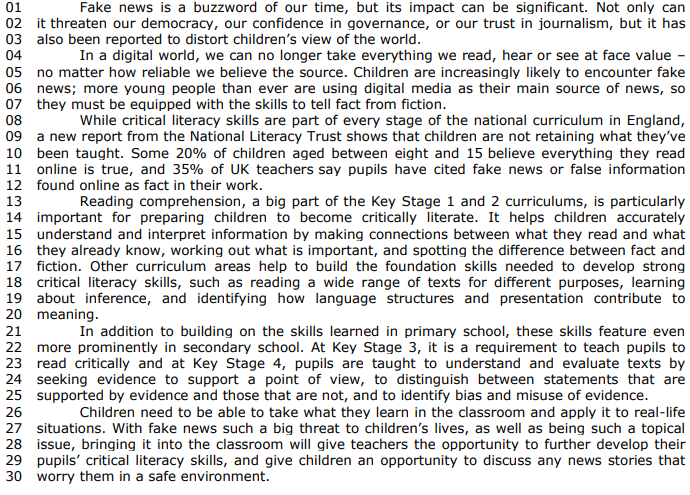
Adapted from https://www.theguardian.com/teacher-network/2017/oct/17/fake-news-improved-criticalliteracy-skills-teaching-young-people
Instruction: Answer question based on the following text.
Fake news: improved critical literacy skills are key to telling fact from fiction

Adapted from https://www.theguardian.com/teacher-network/2017/oct/17/fake-news-improved-criticalliteracy-skills-teaching-young-people
Instruction: Answer question based on the following text.
Fake news: improved critical literacy skills are key to telling fact from fiction

Adapted from https://www.theguardian.com/teacher-network/2017/oct/17/fake-news-improved-criticalliteracy-skills-teaching-young-people
Instruction: Answer question based on the following text.
Fake news: improved critical literacy skills are key to telling fact from fiction

Adapted from https://www.theguardian.com/teacher-network/2017/oct/17/fake-news-improved-criticalliteracy-skills-teaching-young-people
Instruction: Answer question based on the following text.
Fake news: improved critical literacy skills are key to telling fact from fiction

Adapted from https://www.theguardian.com/teacher-network/2017/oct/17/fake-news-improved-criticalliteracy-skills-teaching-young-people
Instruction: Answer question based on the following text.
Fake news: improved critical literacy skills are key to telling fact from fiction

Adapted from https://www.theguardian.com/teacher-network/2017/oct/17/fake-news-improved-criticalliteracy-skills-teaching-young-people
Instruction: Answer question based on the following text.
Fake news: improved critical literacy skills are key to telling fact from fiction

Adapted from https://www.theguardian.com/teacher-network/2017/oct/17/fake-news-improved-criticalliteracy-skills-teaching-young-people
Instruction: Answer question based on the following text.
Fake news: improved critical literacy skills are key to telling fact from fiction

Adapted from https://www.theguardian.com/teacher-network/2017/oct/17/fake-news-improved-criticalliteracy-skills-teaching-young-people
Instruction: Answer question based on the following text.
Fake news: improved critical literacy skills are key to telling fact from fiction

Adapted from https://www.theguardian.com/teacher-network/2017/oct/17/fake-news-improved-criticalliteracy-skills-teaching-young-people
Instruction: Answer question based on the following text.
Fake news: improved critical literacy skills are key to telling fact from fiction

Adapted from https://www.theguardian.com/teacher-network/2017/oct/17/fake-news-improved-criticalliteracy-skills-teaching-young-people
( ) Teachers are worried because students are citing false information found online as fact in their work. ( ) Students have problems, and do not memorize what they learn. ( ) Reading comprehension is key to develop students’ critical literacy.
From the top to the bottom, the parentheses are correctly filled with:
Some words in English sound the same when they are spoken, but have different spellings and different meanings.
Which alternative contains the correct sequence to complete the sentences?
1st - Do you think it is going to (rein, rain, reign) tomorrow?
2nd - We saw a restaurant just off the (rode, road) about a mile back.
3rd - They don’t want to talk about the (passed, past) anymore.
4th - My mother (sent, scent, cent) a letter to my aunt who lives in London.
5th
- (He’ll, Heel, Heal) be here in a few minutes.
Maicon acorda às 6h30min, vai ao banheiro, escova os dentes com Close up, se arruma, toma café e sai para o trabalho. Ao chegar, cumprimenta seus amigos, vai para sua sala, liga seu notebook e verifica se mouse está funcionando. Logo em seguida, conecta-se à web e olha sua caixa de e-mail. Então, dá início ao expediente. Depois de um tempo, é hora do almoço e decide variar o cardápio: hoje não vai ao restaurante de self-service. Assim, se dirige a um pit dog perto de seu escritório. É um trailer de fast food que serve sanduíches; para acompanhar, pede uma Pepsi light. Terminada a refeição, Maicon decide ouvir um pouco de música que ele salvou em um pen drive. Então, vai até o carro – uma SUV 2020, recém adquirida -, para uma sessão do melhor rock n’ roll. Logo percebe que está na hora de voltar ao trabalho. No caminho, passa por um outdoor e nota que uma loja de um dos shoppings da cidade está anunciando jeans a um preço muito bom. Decide ligar para a esposa, Jenifer, e contar a novidade. Ela diz que já havia visto e achado tudo muito fashion, mas muito caro. Um pouco depois, ele chega ao serviço para a segunda parte do expediente. Ele trabalha com marketing. Por volta das 4h30min, já é hora do coffee break. Maicon vai ao Barranco’s bar, uma lanchonete, e pede um hot dog com muito ketchup. O rapaz encontra um amigo tomando Red Bull, mas decide não a fazer o mesmo, pois ficaria muito agitado. Terminado o dia de serviço, volta para casa, encontra sua esposa preparando o jantar, a cumprimenta e vai tomar banho. Fica irritado, pois o shampoo mal deu para lavar o cabelo. Depois, assistem o Big Brother na TV e seu filho mais novo pede para jogar videogame em seu Playstation, mas Maicon diz que já está tarde para jogar. Jenifer muda de canal e eles percebem que está passando um show ao vivo com os hits da sua banda gospel favorita. Mas, infelizmente, já é hora de ir dormir porque no dia seguinte a jornada recomeça. Adaptado de: https://www.englishexperts.com.br/estrangeirismos-a-influencia-do-ingles-no-portugues/. Acesso em: 08 Out 2019.
É falsa a alternativa:
Assinale a alternativa incorreta.
1ª) preço de cada alimento; 2ª) quais são os salgados e as sobremesas; 3ª) para quantas pessoas serve cada um; 4ª) nome da empresa que produz alguns dos alimentos; 5ª) como todos eles são embalados.
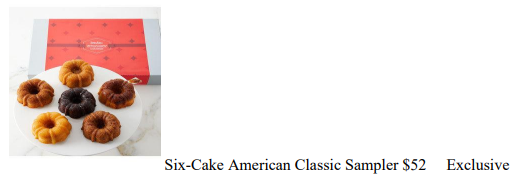
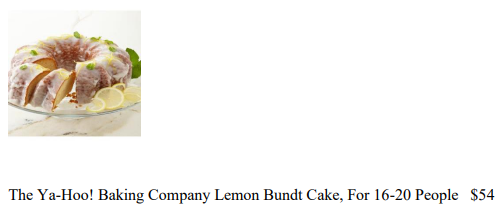
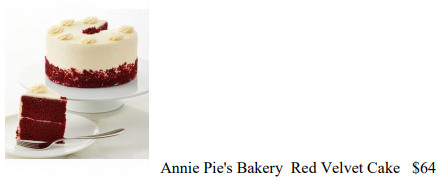
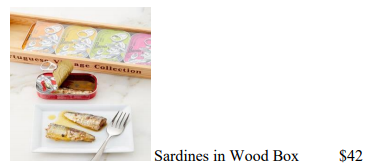
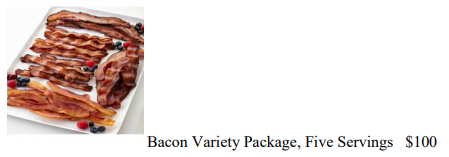
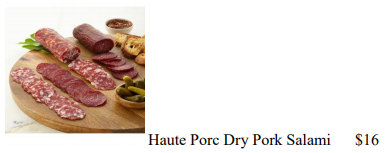
A afirmativa verdadeira é a letra:
Disponível em: https://www.neimanmarcus.com/c/home-gourmet-food-desserts-cat40440735?navpath=cat000000_cat000553_cat40350757_cat40440735&source=leftNav https://www.neimanmarcus.com/c/home-gourmet-food-meat-poultry-cat24040749?navpath=cat000000_cat000553_cat40350757_cat24040749&source=leftNav Acesso em: 08 Out 2019.
Assinale a alternativa que contém a afirmação incorreta.
The false alternative is in the letter:
About four skills, one of the statements below is not correct. Which is it?
Read the next statements.
1st) Have you tried this ice cream? It's the bee's knees, it really is! 2nd) I love “The Big Bang Theory”. The characters are so geek! 3rd) You spend far too much time watching the telly. 4th) Someone nicked my bike, bro! 5 th) Make us a cuppa, will you, love?
Tick the correct alternative.
There is incorrect use of the adjective order in the sentence of the letter: